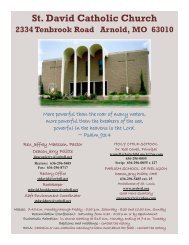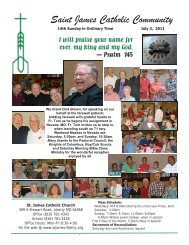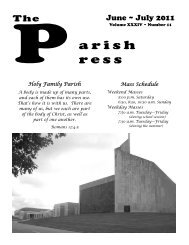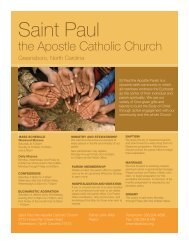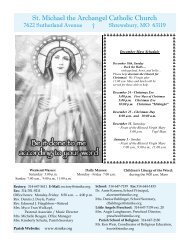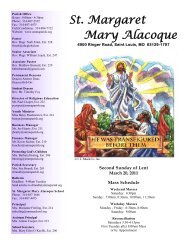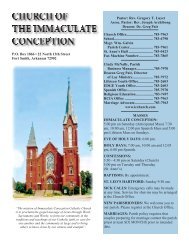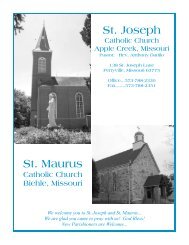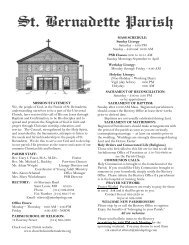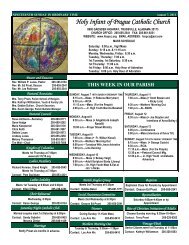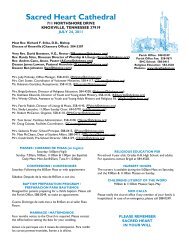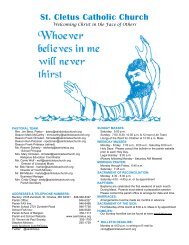June 19, 2011 - Psichurch.com
June 19, 2011 - Psichurch.com
June 19, 2011 - Psichurch.com
You also want an ePaper? Increase the reach of your titles
YUMPU automatically turns print PDFs into web optimized ePapers that Google loves.
Ministries and Roles Within<br />
Liturgical Assembly at Mass<br />
(part 1)<br />
When the Church <strong>com</strong>es together in the liturgical<br />
assembly to celebrate the Mass, or any other<br />
sacrament, her members do not gather simply as a<br />
crowd, as an amorphous, undifferentiated group<br />
of people. They gather in a variety of ministries and<br />
roles. If we are to understand the significance of these<br />
ministries and roles, we must begin with Baptism, for<br />
only one who through Baptism has been given a share<br />
in the priesthood of Christ is capable of participating in<br />
the public worship which is the liturgy of the Church.<br />
In fact, the Constitution on the Sacred Liturgy of the<br />
Second Vatican Council tells us that participation in the<br />
liturgy is the right and duty of all the baptized.<br />
The first qualification, then, for any participant in the<br />
celebration of the Eucharist is that he or she has been<br />
baptized into the Body of Christ, the Church. Each time<br />
the members of the Church gather to worship, they do<br />
so because their baptism demands this of them. While<br />
all share in the priesthood of Christ which delegates<br />
them to worship, some members of the Church are<br />
called by God to serve in the ministerial priesthood as<br />
bishops and priests. Bishops and priests are privileged<br />
to act in the liturgy in the very person of Christ, on<br />
behalf of his people, pronouncing the most sacred<br />
prayers of our faith, presiding over the celebration<br />
of the sacred mysteries, explaining God’s Word and<br />
feeding God’s people on the body and blood of Christ.<br />
A bishop has the added responsibility of being the chief<br />
shepherd, the principal liturgist of his diocese and in<br />
that role is the successor of the Apostles. Others by<br />
God’s grace are ordained to the ministry of deacon.<br />
In the celebration of the Mass deacons proclaim the<br />
Gospel and assist the bishop and priest in exercising<br />
their sacred duties.<br />
In addition to the ordained ministries there are roles<br />
in the liturgy which are exercised by lay people<br />
who place their time and talent at the service of the<br />
liturgical assembly as acolytes (altar servers), lectors,<br />
extraordinary ministers of Holy Communion, cantors,<br />
choir members, instrumentalists, leaders of song<br />
and ushers. Others contribute their time and talent<br />
to planning and organizing the liturgy, to keeping the<br />
church and the vestments, vessels and appointments<br />
clean and well-ordered or to providing decorations that<br />
reflect the spirit of the liturgical feast or season.<br />
The General Instruction makes it very clear that this<br />
variety of offices and roles is desirable and should<br />
be maintained. In fact it goes so far as to state: ...<br />
all, therefore, whether they are ordained ministers or<br />
Christian faithful, in fulfilling their offices or their duty,<br />
should carry out solely but <strong>com</strong>pletely that which<br />
pertains to them.” Not only, therefore, is it desirable<br />
that individuals function in roles of service at Mass, it is<br />
clear from the Instruction that if a deacon, for example,<br />
is present, the priest celebrant or a concelebrant<br />
should not read the Gospel. And the lector should not<br />
also take on the role of server and/or extraordinary<br />
ministers of Holy Communion. There is a wide variety<br />
of services to be performed, and it is desirable that<br />
different individuals exercise those services so that the<br />
talents and gifts God has placed within the Christian<br />
<strong>com</strong>munity are fully utilized and these roles of service<br />
are not monopolized by a few.<br />
It is not sufficient, however, simply to have a “warm<br />
body” filling a given role. Those engaged in liturgical<br />
roles need to be well-prepared for those roles and to<br />
know how to carry them out with reverence, dignity<br />
and understanding. Obtaining the proper preparation<br />
requires a further gift of time on the part of the person<br />
being prepared as well as on the part of those in the<br />
parish responsible for the training of liturgical ministers.<br />
Finally, the practical task of assigning individuals to<br />
particular Masses and organizing the distribution of<br />
roles is another indispensable element in the fabric of<br />
well-ordered liturgical ministry in a parish.<br />
© United States Conference of Catholic Bishops · 3211 Fourth St<br />
NE · Washington DC 20017 · 202.541.3060 · All rights Reserved<br />
4 | Ordinary Time



